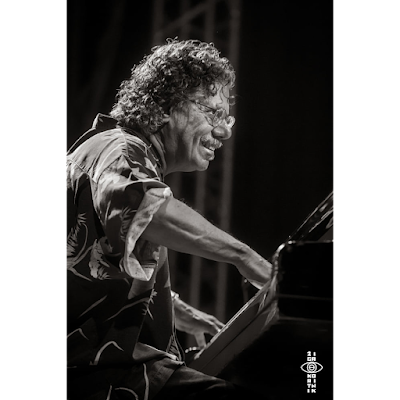 |
| Chick Corea, Skopje Jazz Festival 2009 ©Ziga Koritnik |
By Paul Acquaro
We were surprised to hear about pianist and composer Chick Corea’s passing this week from a rare and only recently detected form of cancer. Over the past few months, throughout the various lockdowns, it seems as if Corea was producing online videos, conducting master classes, and keeping busy.
While Corea may be more often associated with his more straight ahead Akoustic Band, or fusion with Return to Forever and later the Elektrik Band, as well as duos with vibraphonist Gary Burton (ECM’s 2009 box set Crystal Silence-the Ecm Recordings 1972-79 is worth tracking down), he also famously worked with Miles Davis during his earlier jazz-rock period (In a Silent Way, Bitches Brew, Live-Evil, Live at the Fillmore East, and is featured in the film Miles Electric: A Different Kind of Blue of Davis’ Performance at The Isle of Wight in 1970).
This period was followed by a short-lived but influential collaboration with woodwindist Anthony Braxton, bassist David Holland, and drummer Barry Altschul in the group Circle, which recorded Live in Paris for ECM, as well as a recording minus Braxton in 1971, A.R.C (also on ECM). Two recordings on Blue Note also document this more avant-garde leaning time for Corea. Circling In (Blue Note, 1975) was a collection of Corea’s work with some formative work by Circle, and Circulus from 1978 was a collection of live performances from 1970.
The depth and breadth of Corea’s work is daunting to capture, but his musical spirit is not. From live performances, to his many recordings, and his later educational work, Corea leaves a giant imprint.
—
By Stef Gijssels
Chick Corea is one of those musicians who’ve done it all, and who were able to do it all, thanks to their virtuosity and creative insights. My first contacts with Corea where his jazz rock or fusion efforts, first with Miles Davis, and later with Return To Forever. As a young man, I was fascinated by the musical pyrotechnics of the latter, just like I was in awe for the instrumental prowess of bands such as the Mahavishnu Orchestra or Weather Report.
My favourite album was Romantic Warrior (1976), a ‘horror’ of an album musically, the epitome of bad taste in music, but at the same time a musical circus full of incredible acrobatics, swallowing swords, eating fire and jumping from horses, with so many things happening at the same time, unexpectedly and so fast that you do not know where to direct your attention. I’m listening to it now, and it still has that madness of attraction: the breakneck speed unison lines, the unexpected twists and turns. I do not think one note on this album is improvised, as it is constructed and arranged in minute detail, with layers of additional sounds in post-production. It is arrogant, show-offish, programmatic and basically with little to say (I always wondered why an album that is so emotionally dead could have the word ‘romantic’ in its title). It is the actual complete opposite of jazz. But admittedly, the technical musicianship is extraordinary, a kind of instrumental extravaganza.
On the other hand, there is Corea as a solo performer, playing pieces of Bill Evans, calmly, emotionally compelling – romantic even – and with real musicianship, improvising full concerts and managing to keep the listener’s attention, or his brilliant and agitated album “ARC” (1971) with Dave Holland and Barry Altschul, which is more in post-bop or free bop mode, one of my favourites. My musical tastes changed, and so did his, and clearly in different directions. Despite this, he still had a strong impact on the musical appreciation in my life. I am listening to ARC now. Thank you Chick!

